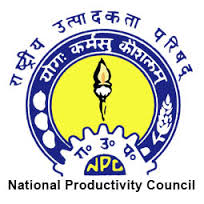Table of Contents
National Productivity Council Syllabus and Exam Pattern
National Productivity council (NPC) exam that come under CGPDTM and is taken by (CGPDTM) for the Recruitment to the posts of Examiner of Patents & Designs. This examination undergoes a various levels of written test that we have covered all the sectors.
Structure of NPC Exam
The Examination will be held in two Phases
1) Preliminary Examinati
2) Mains Examination.
| Sr.No. | Stage of Exam | Max. | Duration | ||||
| Marks | |||||||
| 1. | Preliminary Exam (Screening Exam) |
150 | 2 Hours | ||||
| 2. | Main Exam Paper-I (Scoring Exam) |
300 | 3 Hour | ||||
| 3. | Main Exam Paper-II (Qualifying Exam) |
100 | 1 Hour | ||||
Preliminary Written Examination
Exam Pattern :-
► The written test will be of Multiple Choice Objective Type (OMR based).
► There will be 150 Questions an each question will consist of 1 Mark each in this paper.
| Section | Subject | Questions | ||
| 1 | General English | 30 | ||
| 2 | General Science | 30 | ||
| 3 | Verbal and Non-Verbal Reasoning |
|
30 | |
| 4 | Quantitative Aptitude |
|
30 | |
| 5 | G.K. & Current Affairs |
|
30 | |
| TOTAL | 150 | |||
► There will be no Sectional Cut-offs, in this Exam. However, there will be a negative marking of 33% for wrong answers.
Read Also – NPCC Asst Engineer Previous Papers With Answer
Exam Syllabus for National Productivity Council
General English
The aim of the paper is to test the candidate’s ability to read the things and to know how much he is able to communicate and express his words. there will be certain things that will be cover in the English section, they are
- Comprehension of given passages
- Précis Writing
- Usage and Vocabulary
- Short Essays
General Science
These tests are designed to test candidate knowledge of things happening around him , the technology , the scientific methodology concepts, principles, techniques and physics, chemistry, life sciences (Biology), zoology the earth/space sciences, technologies, chemical reactions etc.
Verbal and Non-verbal Reasoning
The Verbal /Logical Reasoning test involves letter sequences and tests your ability to think logically and analytically. There are different types of question asked to test whether the candidates thinking power and relating things.
Quantitative Aptitude
These test is taken to test the calculation speed of the candidate to calculate the things. It covers a good weight age of marks in the examination to pass the exam. The questions range from different levels from numeric’s to graph, data interpretation and table reading, work and time, Profit and loss, percentage analysis, categorization and quantitative analysis. The questions are designed in a way to check the calculation power and speed of the candidate.
Current Affairs
This test is taken to test the knowledge of candidate to know whether he is are of the things happening around him or not .Current affairs are the day to day incidents and events around us. It revolves around happenings in different field related to national, international, economy, sports, science and technology, environment
Main Written Examination
Exam Pattern :-
The Main Examination will have two Papers namely :
Main Exam Paper-I
Main Exam Paper-II
Main Exam Paper-I
► There will be a descriptive Question Paper of the concerned Discipline/Subject opted by the candidate.
► This paper shall be of 3 hours duration and shall have a maximum of 300 marks.
► No electronic gadgets, nor any type of things that will help in calculation except scientific calculator shall be permitted.
Main Exam Paper-II
► It will be an English Proficiency Question Paper.
► This paper shall be of 1 hour duration and shall have a maximum of 100 marks.
► This test is designed to test the English Writing, Power of Expression & Report Writing Skills/Ability of the candidates.
Exam Syllabus for National Productivity Council
Paper-I
Chemistry
- Inorganic Chemistry
- Physical Chemistry
- Organic Chemistry
- Chemistry in Nano science and technology
- Catalysis and green chemistry
- Medicinal chemistry
- Supramolecular chemistry
- Environmental chemistry
Polymer Science
- Chemistry of high polymers
- Polymer Characterization
- Synthesis and properties
- Polymer blends and composites
- Polymer Technology
- Polymer rheology
- Polymer processing
- Polymer testing
Biochemistry
- Organization of life
- Metabolism and bioenergetics
- Biological membranes
- Immune system
Biotechnology
- Microbiology
- Biochemistry
- Molecular Biology and Genetics
- Process Biotechnology
- Bioprocess Engineering
- Plant and Animal Biotechnology
- Characteristics of animal cells
- Immunology
- Recombinant DNA Technology
- Bioinformatics
- Food Chemistry and Nutrition
- Food Microbiology
- Food Products Technology
- Food Engineering
Microbiology
- Historical Perspective
- Methods in Microbiology
- Microbial Taxonomy and Diversity
- Prokaryotic and Eukaryotic Cells
- Microbial Growth: Definition of growth
- Control of Micro-organisms
- Microbial Metabolism
- Microbial Diseases and Host Pathogen Interaction
- Chemotherapy/Antibiotics
- Microbial Genetics
- Microbial Ecology
Bio-Medical Engineering
- Biomedical Instrumentation
- Anatomy and Physiology
- Medical Physics and Biochemistry
- Biomedical Signal Processing
- Medical Image Processing
- Microprocessor-based Medical Instrumentation
- Biomaterials
- Biomechanics
Computer Science/ Information Technology
- Digital Logic
- Computer Organization and Architecture
- Programming and Data Structures
- Algorithms
- Theory of Computation
- Compiler Design
- Operating System
- Databases
- Information Systems and Software Engineering
- Computer Networks
- Web technologies
Physics
- Mathematical Methods of Physics
- Classical Mechanics
- Electromagnetic Theory
- Quantum Mechanics
- Thermodynamic and Statistical Physics
- Electronics and Experimental Methods
- Mathematical Methods of Physics
- Classical Mechanics
- Electromagnetic Theory
- Quantum Mechanics
- Thermodynamic and Statistical Physics
- Electronics and Experimental Methods
- Atomic & Molecular Physics
- Condensed Matter Physics
- Nuclear and Particle Physics
Electrical Engineering
- Circuit Theory
- Signals & Systems
- E.M. Theory
- Analog Electronics
- Digital Electronics
- Energy Conversion
- Power Electronics and Electric Drives
- Analog Communication
- Control Systems
- Microprocessors and Microcomputers
- Measurement and Instrumentation
- Power Systems
- Power System Protection
- Digital Communication
Electronics & Communication
- Materials and Components
- Physical Electronics, Electron Devices and ICs
- Signals and Systems
- Network theory
- Electromagnetic Theory
- Electronic Measurements and instrumentation
- Analog Electronic Circuits
- Digital Electronic Circuits
- Control Systems
- Communication Systems
- Microwave Engineering
- Computer Engineering
Mechanical Engineering
- Mechanics
- Engineering Materials
- Theory of Machines
- Manufacturing Science
- Thermodynamics, Gas Dynamics and Turbine
- Heat Transfer
- I .C. Engines
- Steam Engineering
- Refrigeration and air-conditioning
Civil Engineering
- Engineering Mechanics
- Static Friction
- Kinematics and Kinetics
- Strength of Materials
- Structural Analysis
- Structural Steel Design
- Design of Concrete and Masonry Structures
- Fluid Mechanics
- Dimensional Analysis and Similitude
- Laminar Flow
- Open channel flow
- Hydraulic Machines and Hydropower
- Geotechnical Engineering
- Construction Technology, Equipment, Planning and Management
- Surveying and Transportation Engineering
- Hydrology, Water Resources and Engineering
- Environmental Engineering
Metallurgical Engineering
- Thermodynamics and Rate Processes
- Extractive Metallurgy
- Physical Metallurgy
- Mechanical Metallurgy
- Manufacturing Processes
Textile Engineering
- Textile Fibres
- Yarn manufacture and yarn structure & properties
- Fabric manufacture and Fabric Structure
- Textile Testing
- Preparatory Processes
- Dyeing
- Printing
Paper-II
This test is a qualifying test and is to be designed to assess the working English knowledge, efficiency and expression of English and Report Writing abilities.
Visit Current-Affairs.org for the current affairs, previous year question papers, online quiz for the competitive exams and many more. If you need more question paper comment down your email id.




